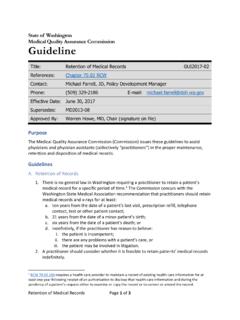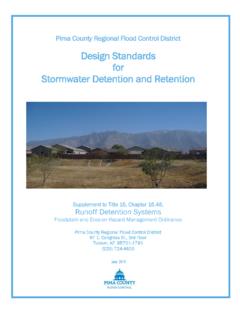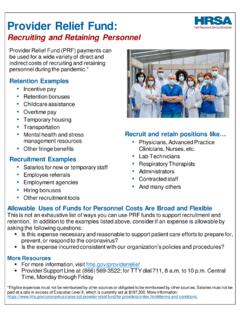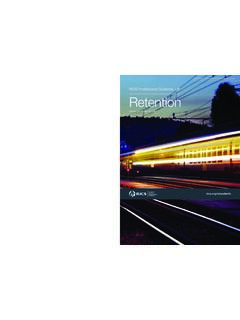Transcription of Guidance on the Employee Retention Credit under the …
1 1 Guidance on the Employee Retention Credit under the CARES Act for the First and Second Calendar Quarters of 2021 Notice 2021-23 I. PURPOSE This notice amplifies Notice 2021-20, 2021-11 922, which provides Guidance on the Employee Retention Credit under section 2301 of the Coronavirus Aid, Relief, and Economic Security Act (CARES Act), Pub. L. No. 116-136, 134 Stat. 281 (March 27, 2020), as amended by section 206 of the Taxpayer Certainty and Disaster Tax Relief Act of 2020 (Relief Act), enacted as Division EE of the Consolidated Appropriations Act, 2021, Pub. L. No. 116-260, 134 Stat. 1182 (December 27, 2020). Specifically, this notice expands on the Guidance provided in Notice 2021-20 by providing Guidance with respect to the amendments made to section 2301 of the CARES Act by section 207 of the Relief Act, which are effective beginning January 1, 2021. II. BACKGROUND Section 2301 of the CARES Act, as originally enacted, provides for an Employee Retention Credit for eligible employers, including tax-exempt organizations, that pay qualified wages, including certain health plan expenses, to some or all employees after March 12, 2020, and before January 1, 2021.
2 Section 206 of the Relief Act adopted amendments and technical changes to section 2301 of the CARES Act for qualified 2 wages paid after March 12, 2020, and before January 1, 2021, primarily relating to who may claim the Credit . Section 206 of the Relief Act is retroactive to the enactment of the CARES Act. Section 207 of the Relief Act, which is prospective only, further amends section 2301 of the CARES Act to extend the application of the Employee Retention Credit to qualified wages paid after December 31, 2020, and before July 1, 2021, and to modify the calculation of the Credit amount for qualified wages paid during that time . On March 1, 2021, the Department of the Treasury (Treasury Department) and the Internal Revenue Service (IRS) issued Notice 2021-20, providing Guidance on the Employee Retention Credit under section 2301 of the CARES Act, taking into account the amendments made by section 206 of the Relief Act. Notice 2021-20 continues to apply to all Employee Retention credits for calendar quarters in 2020.
3 This notice amplifies Notice 2021-20 by providing additional Guidance on section 2301 of the CARES Act and addressing the amendments made by section 207 of the Relief Act, applicable to the first and second calendar quarters of 2021. As amplified by this notice, the applicable provisions of Notice 2021-20 addressing rules that were not changed by section 207 of the Relief Act, continue to apply to Employee Retention credits for the first and second calendar quarters of 2021. Section 9651 of the American Rescue Plan Act of 2021 (ARP Act), Pub. L. No. 117-2, 135 Stat. 4 (March 11, 2021), enacted section 3134 of the Internal Revenue Code (Code), which provides an Employee Retention Credit for wages paid after June 30, 2021, and before January 1, 2022. This notice does not address the Employee 3 Retention Credit provided by section 3134 of the The Employee Retention Credit governed by section 3134 of the Code will be addressed in future Guidance . III. Guidance A.
4 Extension of Employee Retention Credit Section of Notice 2021-20 provides rules related to the determination of qualified wages paid by an eligible employer for purposes of the Employee Retention Credit for 2020. Section 2301(m) of the CARES Act, as amended by section 207(a)(1) of the Relief Act, provides that section 2301 of the CARES Act applies to wages paid after March 12, 2020, and before July 1, Accordingly, an eligible employer may also claim the Employee Retention Credit for qualified wages paid in the first and second calendar quarters of 2021. B. Eligible Employers 1 Section 3134 of the Code generally maintains the structure of the Employee Retention Credit as provided under section 2301 of the CARES Act, as amended, with certain changes. Among other changes, section 3134 of the Code (1) makes the Employee Retention Credit available for eligible employers that pay qualified wages after June 30, 2021, and before January 1, 2022; (2) applies the Credit against taxes imposed under section 3111(b) of the Code, or so much of the taxes imposed under section 3221(a) of the Code as are attributable to the rate in effect under section 3111(b) of the Code; (3) expands the types of eligible employers to include a recovery startup business (as defined under section 3134(c)(5) of the Code) with a separate maximum Credit amount; (4) modifies the definition of qualified wages for severely financially distressed employers (as defined under section 3134(c)(3)(C) of the Code); (5) modifies the definition of qualified wages to exclude any wages taken into account under sections 41, 45A, 45P, 45S, 51, 1396, 3131, and 3132 of the Code.
5 (6) provides that the Employee Retention Credit shall not apply to so much of the qualified wages paid by an eligible employer as are taken into account as payroll costs in connection with a covered loan under section 7(a)(37) or 7A of the Small Business Act, a grant under section 324 of the Economic Aid to Hard-Hit Small Businesses, Non-Profits, and Venues Act, or a restaurant revitalization grant under section 5003 of the ARP Act; and (7) extends the limitation on the time period for assessment from 3 years to 5 years. 2 Although section 207(a)(1) of the Relief Act extends the Credit to wages paid before July 1, 2021, section 207(k) of the Relief Act provides that the amendments made by section 207 of the Relief Act apply to calendar quarters beginning after December 31, 2020. 4 Section of Notice 2021-20 provides rules for determining whether an employer is an eligible employer for purposes of the Employee Retention Credit for 2020. Section 2301(c)(2) of the CARES Act defines the term eligible employer.
6 Section 2301(c)(2)(A)(i) of the CARES Act, as amended by section 207(a)(2) of the Relief Act, provides that, in order to be an eligible employer, an employer must have been carrying on a trade or business during the calendar quarter for which the Credit is determined under section 2301(a) of the CARES Act. Section 2301(f) of the CARES Act, as amended by section 207(d)(3)(A) of the Relief Act, provides that the Employee Retention Credit is not available to the Government of the United States, the government of any State or political subdivision thereof, or any agency or instrumentality of any of the foregoing (governmental entity). However, amended section 2301(f)(2)(A) provides an exception for any organization described in section 501(c)(1) of the Code and exempt from tax under section 501(a) of the Code, and amended section 2301(f)(2)(B) provides an exception for any governmental entity if the entity is a college or university or the principal purpose or function of the entity is providing medical or hospital care.
7 The flush language of amended section 2301(f)(2) provides that in the case of any governmental entity that is a college or university, or the principal purpose or function of which is providing medical or hospital care, the entity shall be treated as satisfying the trade or business requirement in section 2301(c)(2)(A)(i). Accordingly, these entities may be eligible employers for the first and second calendar quarters of 2021, assuming they satisfy the other requirements to be eligible employers. 5 The Treasury Department and the IRS have determined that, for purposes of amended section 2301(f)(2)(B) of the CARES Act, a college or university means an educational organization as defined in section 170(b)(1)(A)(ii) of the Code and Treas. Reg. (c)(1) that is a college or university, and an entity that has the principal purpose or function of providing medical or hospital care means an entity that has the principal purpose or function of providing medical or hospital care within the meaning of section 170(b)(1)(A)(iii) of the Code and Treas.
8 Reg. (d)(1). C. Decline in Gross Receipts Section of Notice 2021-20 provides rules for determining when an employer experiences a significant decline in gross receipts. For 2020, the period during which there is a significant decline in gross receipts is generally determined by identifying the first calendar quarter in 2020 (if any) in which an employer s gross receipts are less than 50 percent of its gross receipts for the same calendar quarter in 2019. The period during which there is a significant decline in gross receipts ends with the earlier of January 1, 2021 or the calendar quarter following the first calendar quarter in which an employer s 2020 quarterly gross receipts are greater than 80 percent of its gross receipts for the same calendar quarter in 2019. Section 2301(c)(2)(A)(ii)(II) of the CARES Act, as amended by section 207(d)(1)(A) of the Relief Act, provides that an employer is an eligible employer with respect to any calendar quarter for which its gross receipts (within the meaning of section 448(c) of the Code, or, for an eligible employer which is described in section 501(c) of the Code and exempt from tax under section 501(a) of the Code, within the 6 meaning of section 6033 of the Code) for the calendar quarter are less than 80 percent of its gross receipts for the same calendar quarter in 2019.
9 Accordingly, for purposes of the Employee Retention Credit for the first and second calendar quarters of 2021, the determination of whether an employer is an eligible employer based on a decline in gross receipts is made separately for each calendar quarter and is based on an 80 percent threshold. In addition, section 2301(c)(2)(A) of the CARES Act, as further amended by section 207(d)(1)(B) of the Relief Act, states that with respect to any employer for any calendar quarter, if the employer was not in existence as of the beginning of the same calendar quarter in calendar year 2019, section 2301(c)(2)(A)(ii)(II) of the CARES Act is applied by substituting 2020 for 2019. Accordingly, if an employer was not in existence as of the beginning of the first calendar quarter of 2019, that employer generally determines whether the decline in gross receipts test is met in the first calendar quarter of 2021 by comparing its gross receipts in the first calendar quarter of 2021 to its gross receipts in the first calendar quarter of 2020.
10 Similarly, if an employer was not in existence as of the beginning of the second calendar quarter of 2019, that employer generally determines whether the decline in gross receipts test is met in the second calendar quarter of 2021 by comparing its gross receipts in the second calendar quarter of 2021 to its gross receipts in the second calendar quarter of 2020. However, section 2301(c)(2)(B) of the CARES Act, as amended by section 207(d)(2) of the Relief Act, permits an employer to elect to use an alternative quarter to calculate gross receipts. under this election, an employer may generally determine if 7 the decline in gross receipts test is met for a calendar quarter in 2021 by comparing its gross receipts for the immediately preceding calendar quarter with those for the corresponding calendar quarter in 2019 (substituting 2020 for 2019 if the employer did not exist as of the beginning of that quarter in 2019). Accordingly, for the first calendar quarter of 2021, an employer may elect to use its gross receipts for the fourth calendar quarter of 2020 compared to those for the fourth calendar quarter of 2019 to determine if the decline in gross receipts test is met.

















